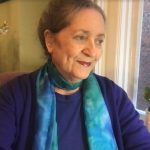June’s Featured Poet | Andrea Hollander
Why My Father Became a Pediatrician
“What young men won’t do,” he says,
shaking his head. “Boys, really.”
We’re walking down Court Street
in Brooklyn past all the specialty shops—
cheese wheels in one window, fresh salmon
and mussels on racks of ice in another,
a waist-high barrel of pickles outside a deli.
At a butcher shop he stops, stares at a row
of skinned rabbit carcasses hanging above
a tray of dark purple livers and pink chops.
He tells me for the first time
about the field hospital in France
where he was stationed during the war.
“A tent, really,” he says. Every day
a scalpel in his hand, his army drabs
stained red. Peering into an anesthetized
body of a boy, he’d catch his breath
beneath his surgical mask. American,
French, even German, it didn’t matter.
He cut through damaged tissue and bone,
removed gangrened flesh that lay hidden
beneath a boot. Afterwards the intricate
suturing, mangled limbs taken away,
the table made antiseptic again,
hour after hour, only to be bloodied
again, one body becoming another.
And another and another.
Twenty-five
Santa Cruz, California, 1972
Cocktail waitress at the golf club bar, the only job I could get,
weekday afternoons when men—there were always only men—
spent more time in that darkness than out on the course.
Harvey, the bartender, taught me everything I needed to know:
which gins took olives, which twists, the proper number of onions
in a Gibson, how to choose a maraschino for a Manhattan.
He teased with a wink that the Wallbanger was named after him.
After my shift I’d sit at a table near the sign for the Ladies,
the only place the drunks—and weren’t they all drunk by then?—
left me alone. In his fifties, Harvey worried about his son
in Vietnam. He’d bring me a drink to try, “your real education”:
whiskey sours, white Russians, mimosas—the sweet drinks—
and we’d talk. That’s when I learned to listen. I knew I was
out of my depths, as the saying goes, and not just about alcohol.
Quiet at that dark table, I took in the truths Harvey shared
about Vietnam, these men, even about my new boyfriend,
a man my age I’d met at a bookstore who said he was a poet.
Poet—what I was trying to become. He’d escaped the draft
with his lucky high number but still hadn’t found a job. How,
Harry asked, did I think my boyfriend spent these afternoons?
Was he at some café drafting poems, while I earned our groceries
by letting drunk men flirt with me and pat my ass? By the end
of summer I left California and my boyfriend. But I never said
goodbye to Harvey, never thanked him. I don’t know whether
his son returned, or, if he did, whether he brought the war home
with him the way my father had, a veteran of World War II
who refused to talk about it. I doubt that Harvey, if he’s still
alive, reads poems. But even so, this one’s for him.


